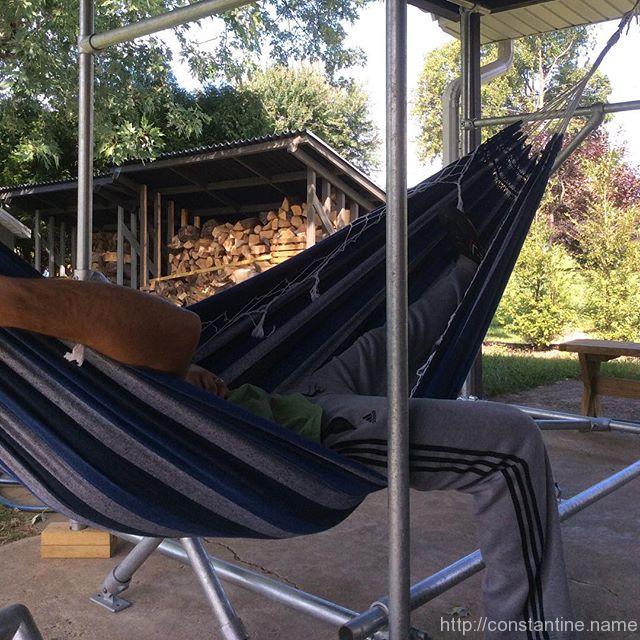Science fiction has the capacity to inspire by setting the vision of a radically better future, and by making it clear that the future won’t happen unless we put in the work.
~ Dan Wang
slip:4a1470.
Science fiction has the capacity to inspire by setting the vision of a radically better future, and by making it clear that the future won’t happen unless we put in the work.
~ Dan Wang
slip:4a1470.
Matrix – with Ryland Lanagan
What drives adults to embrace a parkour-based fitness program, and how can it contribute to their physical, mental, and emotional well-being?
Join Craig Constantine and Ryland Lanagan as they discuss Ryland’s journey towards longevity, where functional fitness and the sheer joy of movement lead to a healthier and happier life.
[When asked what gets adults engaged?] 100%, it is fun. Fun is that common ingredient… Everybody that gives themselves permission to come in and maybe falter in front of strangers or put themselves out there— Once you’re willing to do that and you start to learn techniques, or you’re starting to exercise, a whole cascade of things happen.
~ Ryland Lanagan ~24’30”
Ryland introduces his Movement Matrix Method, a structured approach to learning parkour that is specifically designed for adults. He shares his remarkable journey from an overweight and disheartened Army veteran to a passionate advocate for parkour. He describes how parkour became a lifelong passion that has not only transformed him physically, but also transformed his outlook on life.
Takeaways
Passion and Fun — The driving force behind Ryland’s commitment to parkour is the sheer joy and fun it brings.
Physical and Mental Benefits — Parkour offers numerous physical and mental benefits. It helps individuals feel proud of their accomplishments.
Longevity and Functional Fitness — Parkour isn’t just about flashy moves but also about developing functional fitness.
Starting Early — While it’s never too late to start parkour, people should begin as soon as possible to avoid letting decades pass without engaging in physical activity.
Passion is Contagious — Enthusiasm for parkour is contagious, and sharing this passion with others can inspire them to try parkour and experience its benefits.
Resources
Movement Matrix Method: Ryland describes his movement program incorporating a structured approach to teaching parkour skills, ensuring students progress safely and effectively. https://go.rylandlanagan.com/mmm-registration
(Written with help from Chat-GPT)
ɕ
Love ’em or hate ’em, big platforms with big collections of people and information about said people are currently ever-present. This deep dive from Masnick has a bias—one which I wholeheartedly endorse—but it is also an excellent description of what does “protocols versus platforms” really mean? What’s a protocol, and what’s a platform? How are they different, and why do they seem to have such different effects on the late-game situation? If you’ve so far avoided this topic, this is a good place to try spending a half an hour to see if it makes more sense.
After a decade or so of the general sentiment being in favor of the internet and social media as a way to enable more speech and improve the marketplace of ideas, in the last few years the view has shifted dramatically—now it seems that almost no one is happy. Some feel that these platforms have become cesspools of trolling, bigotry, and hatred. Meanwhile, others feel that these platforms have become too aggressive in policing language and are systematically silencing or censoring certain viewpoints. And that’s not even touching on the question of privacy and what these platforms are doing (or not doing) with all of the data they collect.
~ Mike Masnick from, Protocols, Not Platforms: A Technological Approach to Free Speech | Knight First Amendment Institute
slip:4ukico1.
ɕ
There is a tide in the affairs of men
~ Shakespeare‘s Julius Caesar
Which, taken at the flood, leads on to fortune;
Omitted, all the voyage of their life
Is bound in shallows and in miseries.
On such a full sea as we now afloat;
And we must take the current when it serves,
Or lose our ventures.
slip:4a1283.
Nine years ago I wrote a journal entry containing this quote:
At the end, when your legs are tired
~ unknown
and your arms are giving out,
GET ANGRY.
Get angry that you are tired.
THEN HIT IT HARDER.
slip:4a109.
Although I still like that quote, I no longer find it inspiring. For me, the time and place for that mindset are behind me. I’m not quitting. Rather, when I get tired and my arms and legs give out, I now think: I misjudged the goal. I can access that other mindset if I choose to go on, but I’m also serenely happy to rest.
ɕ
I think the reward for conformity is that everyone likes you except yourself.
slip:4a604.
For even peace itself will supply more reason for worry. Not even safe circumstances will bring you confidence once your mind has been shocked—once it gets in the habit of blind panic, it can’t provide for its own safety. For it doesn’t really avoid danger, it just runs away. Yet we are exposed to greater danger with our backs turned.
~ Seneca
slip:4a225.
Last week, one of your fellow readers hit reply—replies come directly to my personal email box—and shared some thoughts about connections and interesting juxtapositions in the week’s email. After I pointed out that the patterns they commented on, were simply a byproduct of how I write and how the email is assembled automatically, they rightly observed, “Lol, humans finding patterns where they don’t exist. A timeless classic.” I completely agree, and our power of pattern-finding is an awesome tool.
I was reading, and found a new-to-me Einstein quote. (You’ll find it soon, some time in February.) When I capture a quote from someone already in my collection, I have to check; There are ~800 quotes these days and sometimes I “find” one I’ve forgotten. (Surprisingly though, I can usually tell on sight if it’s in the collection already.) This led me to a search for “einstein” here on the blog. (There’s also a tag for Albert Einstein, but the search nets more posts including those I failed to tag.) I found a quote already on the blog—but not the new one that prompted it all—that was so old, it wasn’t in my collection. I fixed that, leading to a very old blog post, with a very high slipbox address, 4a784: Part of a Whole. And also 4a789: Do You Have a Question? Those were posted in 2013.
They’re about curiosity and broadening our sphere of compassion. Which sounds a lot like my just-barely-one-year-old vision and mission.
My vision is a world where everyone can flourish. My mission is creating better conversations that spread understanding and compasion.
So, as a human here finding connections, that’s a breadcrumb from 8 years ago hinting at the path I took to today. Awesome.
ɕ
The team must consist of three sorts of specialists, he says. Otherwise the revolution, whether in politics or the arts or the sciences or whatever, is sure to fail. The rarest of these specialists, he says, is an authentic genius — a person capable of having seemingly good ideas not in general circulation. “A genius working alone,” he says, “is invariably ignored as a lunatic.”
~ Kurt Vonnegut from, Bluebeard
Meta: Copy-paste-and-search if you want to read the entire, surrounding passage. As a creator of content myself, I decline to copy and paste the much longer passage as many others have.
This passage from Vonnegut is brilliant, but it makes me a little nervous. Am I the genius? …or more likely, the lunatic? Perhaps I’m one of the other two specialists. Or worse, I’m not any of the three.
Suddenly
I remember why I keep bourbon on hand.
ɕ
To see things in the seed, that is genius.
~ Lao Tzu
slip:4a224.

Hello? It’s basically October. Way to go Pennsylvania.
ɕ
I stand loving America, aware that I often fall short of what that love should mean. When I say I love America I mean I love certain shared values and founding ideals like the rule of law and equality before it, liberty, and self-determination, and what people have done to achieve them. I love the values as lofty as the right to speak and worship and as humble as the right to raise a family and work and live as I see fit. I love it knowing that these ideals are more aspirational than descriptive, more a to-do list than a resume. They are what Lincoln called “unfinished work” and “the great task remaining before us.”
~ Ken White from, «https://popehat.com/2016/08/30/i-stand-despite/»
I happen to be that sort of middle-aged-softie who is deeply moved by our National Anthem.
…but, when I stand for the National Anthem, I do not judge those who do NOT stand (even if they are in the row behind me talking loudly). I love America all the more for its ensuring their right to a freedom of expression; An America where they should never be forced to declare their adoration for the State as a precursor to watching some random sporting event.
ɕ
I don’t count my sit-ups. I only start counting when it starts hurting. When I feel pain, that’s when I start counting, because that’s when it really counts.
slip:4a88.
Resilience.
Why does Parkour so effectively teach resilience? Because your regular world and your regular life are DESIGNED for your interaction. Stairs are a certain height, walking surfaces are smooth and even, door knobs are convenient, chairs, air conditioning, trains and autos; Everything you interact with is designed for human interaction. In a very real sense, that’s what “civilized” means.
Have you ever stopped to consider something as simple and common as doorways? What would life like, if – just for some historic reason – every doorway was only 4 feet high? Life would be much better simply because everyone would have to bend over regularly!
What if stairs were the norm? What if walking was the norm?
When you begin exploring your world through the lens of Parkour, you are told to intentionally seek out challenges. In Parkour practice, you’re exposing yourself to a hard choice: Bend your mind and body to the challenge, or face pain and injury. A good coach sets you up for success, but you’re still told to go under that railing, climb over that wall, and put your hands on that rough concrete. You have to teach your mind and body how to be resilient so that you can rediscover the ways already within yourself to interact with an environment that is, at best, indifferent to your wellbeing.
Once you see things differently, you can start interacting with things that were specifically designed for some reason other than human interaction. You start by looking at your world this way as part of a specific practice; “I’m going to class and the instructor makes us do this”. Eventually, the mindset becomes comfortable on its own without prompting, and you begin to automatically practice a mindful resilience in your daily life.
How could I get to that place over there without using that obvious pedestrian route? How would I get down there, or up there? Why am I eating inside when it’s so nice outside? What would I do if an emergency happened right now?
Once you are well and truly comfortable with the resilient mindset, your body relaxes and the physical uncertainty, or even fear, that you were unconsciously feeling goes away. In it’s place wells up good old natural Human Curiosity. Your mind says, “Sure, let’s go this other way,” and, “Let’s take this road less travelled.” It really does make all the difference.
I shall be telling this with a sigh
Somewhere ages and ages hence:
Two roads diverged in a wood, and I—
I took the one less traveled by,
And that has made all the difference.~ Robert Frost, from The Road Not Taken
ɕ

Resilience also requires downtime for recovery. Changing up my scaf routine today to take advantage of the lingering awesome weather.
ɕ
…and now that you don’t have to be perfect, you can be good.
slip:4a131.

Registration! #ARDV14
ɕ
Parkour is about taking the road less travelled by, and choosing the harder path every time. It’s about understanding that excellence does not arise from simply doing what is convenient or what pays well or what advances your personal career. The Olympic Games are sponsored by Coca-Cola and McDonalds. That’s not right.
Have principles. Stick to them. Because if you don’t stand for something you’ll fall for anything.
~ Dan Edwards from, The Business of Parkour: A Question of Principle (or How to Resist the Red-Bullion) – Dan Edwardes
slip:4udaau1.
ɕ